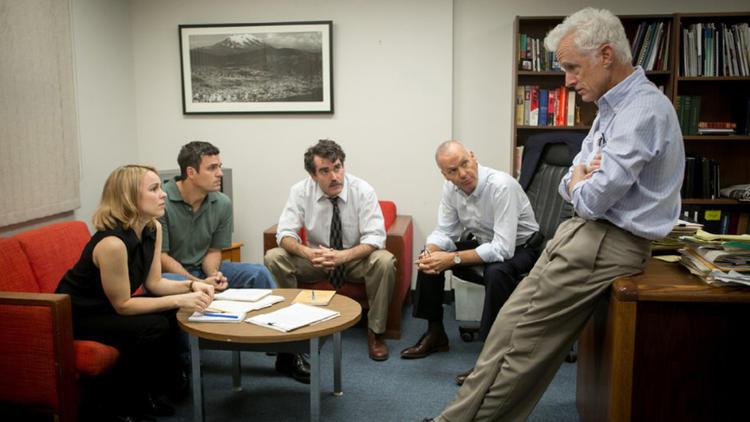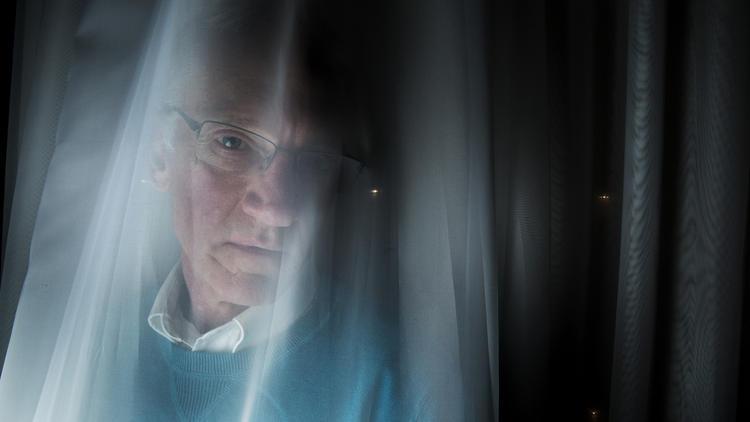|
'Spotlight' reminds us that bad deeds demand accountability
By Ted Slowik
Most oddsmakers and film critics say "Spotlight" is a long shot to take home the Best Picture Oscar at Sunday's Academy Awards. "The Revenant" is favored over the film about The Boston Globe's investigation into the Catholic Church's coverup of priests who sexually abused children. Still, "Spotlight" is an Oscar-worthy film that recounts in dramatic fashion how Globe reporters exposed the systemic transferring of repeat offenders to other parishes, the Church's relentless efforts to discredit accusers and the willingness of good Catholic laymen to go along with the program. Reporters who uncovered abuse in other dioceses appreciate "Spotlight's" accuracy and authenticity. I covered how the issue affected the Roman Catholic Diocese of Joliet, which includes all of Will County. Others on the beat at the time included Allison Hantschel of the Daily Southtown and David Heinzmann of the Chicago Tribune. Southtown columnist Tim Placher recounted his experience being abused by a priest. Those of us who investigated this issue locally encountered the same personal and professional challenges faced by the Globe team as depicted in "Spotlight." I began writing stories early in 2002 about people who were abused as kids by Joliet Diocese priests. I'll never forget the first man who shared his story. I asked if he had any evidence to corroborate his claims. He showed me love letters and valentines sent to him by his abuser from a treatment facility in California, where he was sent after he was caught molesting another boy. Establishing the truth of the stories was the first hurdle. Many readers believed there were a few "bad apples," but doubted the abuse was widespread. Over the next several months I spoke with more than 50 people who shared heartbreaking stories of abuse. The toll of priests mounted. First, four were removed from active ministry; then 10. Today, the Joliet Diocese on its website lists the names of 35 priests with "credible or substantial" allegations. In "Spotlight," actor Stanley Tucci portrays Mitchell Garabedian, an attorney who advocates for abuse victims. In Joliet there was a similar lawyer, Keith Aeschliman, who represented those courageous enough to come forward. Just as in Boston, all signs pointed to the Church hierarchy, but the paper trail was thin. People filed civil lawsuits, but many were dismissed because the statute of limitations had run. Judges agreed to the Church's request to seal the discovery documents related to the cases. In my search for the truth, I made mistakes. Writing about a priest who went to Europe, I said the Shrine of Fatima was in Spain (it's in Portugal). I once incorrectly reported the birthday of Joliet Bishop Joseph Imesch. I learned later he would tell his supporters, "You can't believe anything that Slowik writes. He can't even get his facts straight." One of the bishop's supporters insisted we meet, and she proceeded to tell me about the many good things the bishop had done for the less fortunate in the community. She told me she'd been abused by a family member as a child and the only way she was able to let go of the anger was to forgive her abuser. We should forgive and pray for all the priests and bishops, she said. But other people kept coming to me with stories and information because they wanted the truth to be known. Some say "Spotlight" is the best film about journalism since "All the President's Men." But it reminds me more of the 1999 film "The Insider" starring Russell Crowe as whistle-blowing "Big Tobacco" executive Jeffrey Wigand, and Al Pacino as "60 Minutes" producer Lowell Bergman. It took tremendous courage for Wigand to share trade industry secrets, and he forever changed public awareness about the health consequences of cigarette smoking. High-ranking diocesan insiders came to me. One said at first he was angry with me for hurting the Church, but then he realized what I was doing was good for the Church and he wanted to help me. Minneapolis attorney Jeff Anderson, a prominent legal advocate for clergy-abuse survivors, deposed Imesch and made public his responses to questions. Imesch's own words ended up damning him more than anything I ever wrote, when he said he wouldn't call police even if he knew a priest abused a child. Gradually, the tide turned. Laws were passed extending the statute of limitations. Loopholes were closed, and clergy were no longer exempt from mandatory-reporting requirements regarding sexual abuse of children. Today, it's a crime if a teacher or other authority figure becomes aware of an allegation of childhood sexual abuse and fails to report it. Years passed. I left journalism for a job in public relations. One day in 2013 I received a call from an attorney named Terry Johnson, who wanted to thank me for my work years earlier. Turns out Will County Judge Michael Powers had ruled to unseal thousands of pages of documents about Joliet priests. Johnson was known as an advocate of people harmed by asbestos, not sexual abuse. But he knew how to argue in court for transparency and he was successful at getting documents unsealed. The thing that struck me most about the priest files from the "secret archives" is the compassion with which Imesch and other diocesan officials wrote. The letters ring with genuine apologies and sincere expressions of sadness. But these were letters not to victims, but to perpetrator priests. "I'm sorry for what you're going through, but you got caught and I have to remove you," was the general theme. It was a stark contrast to how the Church responded by attacking the credibility of people who had the courage to come forward and report abuse. The bottom line is that a lot of bishops and other good people behaved horribly because they valued protecting the Church's reputation and assets more than the safety of children. And the saddest thing is, not much has changed. To this day, there's a shocking lack of accountability by bishops and other church leaders who perpetrated a system that enabled untold numbers of children to be abused. "Spotlight" should remind us all that the Church's "protect the house at all costs" response was a catastrophic failure. That it was wrong to use its clout to lobby for exemptions from mandatory reporting laws, to obtain court rulings that allowed the truth to remain hidden and to avoid criminal investigations. That placing the good of the Church ahead of all else, including the safety of children, was wrong. Even now, I'm unconvinced the Church has learned that lesson. Bishops gave known predators access to children, and I've yet to see any of them held accountable for that. Contact: tslowik@tribune.com
|
.
Any original material on these pages is copyright © BishopAccountability.org 2004. Reproduce freely with attribution.

